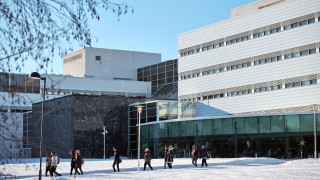New professors of practice in environmental science contribute to building a sustainable future

Saara Vauramo and Kaisa Mustajärvi are the new professors of practice in the Department of Biological and Environmental Science at the University of Jyväskylä. They will strengthen the social impact of the Faculty of Mathematics and Science, the Department of Biological and Environmental Science, and the JYU.Wisdom community in the fields of environmental science and planetary well-being. They provide expertise in constructing a sustainable future in terms of resource wisdom, climate and nature, where the long-term needs of humans and nature are reconciled. In addition, Vauramo and Mustajärvi promote the application of research knowledge in practice, supporting various organisations and enterprises with sustainability challenges and strengthening the role of research and education in enabling social change.
“The new professors of practice have strong expertise, particularly in relation to city organisations and consultancy work,” says Leena Lindström, the Head of the Department of Biological and Environmental Science at the University of Jyväskylä. “They contribute to teaching, research cooperation, strategic planning and the development of continuous learning and continuing education. Their contribution promotes multidisciplinary cooperation and enhances the University’s role in building a sustainable society.”
Saara Vauramo builds bridges between science and working life
Professor of Practice Saara Vauramo is an environmental ecologist by training. She completed her MA and PhD degrees at the University of Helsinki. During her studies, she focused on earth ecology, particularly the ecology of urban environments.
Vauramo is currently working as the head of the Nature department at Ramboll, where she provides nature impact assessments, conducts various ecological investigations, and supports the design of nature strategies for companies and municipalities. Prior to her consultancy work, she worked for years as an environmental expert and director for the City of Lahti. In practice, she contributed to the implementation of the city’s climate objectives by supporting the work of various city departments. In her current role as an environmental consultant, she can focus on understanding of ecological effects and finding better planning solutions.
“I’m excited about this professor of practice position,” says Vauramo. “It offers me a unique opportunity to reconnect with my scientific roots and combine research thinking with the demands of professional practice. I want to make scientific expertise more accessible to companies and help students apply scientific knowledge to different projects in a practical way. I aim to develop new planning solutions that consider nature-related values especially in projects involving challenging land use, and to build bridges between academia and the world of work.”
Making impacts on nature visible
Kaisa Mustajärvi, who is a development manager at the City of Tampere, is a JYU alumna. She studied ecology and environmental management, completing her doctoral dissertation in the biodiversity research programme of the University of Jyväskylä’s Graduate School of Evolutionary Ecology. She now works as a development manager in the Climate and Environmental Policy Unit of the City of Tampere. Through her expert work, she effectively promotes ecological sustainability by guiding, engaging with, and supporting the units, commercial enterprises and subsidiaries of the city organisation to operate in accordance with the city’s environmental and climate policy and its commitments to sustainable development. Prior to her current position, she worked at Ramboll’s environmental and nature-based services, where she developed Ramboll’s ecological services and helped companies assess their impact on nature and develop operation plans for biodiversity as part of their sustainable development efforts.
“The key issues in my professorship of practice include on the other hand understanding the impact of organisations, like cities, on global biodiversity loss by aiding in the development of measuring the biodiversity footprint of organisations and on the other hand developing methods to measure the impacts of cities on their local nature,” says Mustajärvi. “I seek to help refine measuring biodiversity footprint to make it a more impactful tool and develop new methods of monitoring local effects. I want to explore and advance procedures through which organisations and companies can better assess their impacts on nature, and understand the consequences of their actions as part of their sustainable development efforts. This is a core prerequisite for them to make impactful actions and solutions. In cooperation with JYU.Wisdom, we also aim to create educational material to enhance the knowledge and skills of students and individuals already in employment.”
Research is conducted in response to real-world needs
Both new professors of practice emphasise that research should respond to real-world issues and challenges. Research yields knowledge that benefits society, working life and future development.
“When research is connected to practical needs, it has the potential to influence, reform and create meaningful solutions,” says Mustajärvi. “It requires reconciliation, interaction and piecing together a jigsaw puzzle. Good research is needed so that it can be applied to the needs of real customers.”
Studying biology opens doors to working life
For Vauramo and Mustajärvi, it is important to work with students as those studying biology and environmental science offer enormous potential in the world of work. The professors of practice aim to broaden students’ employment opportunities by providing knowledge and insights into the career paths available to them, and the skills they should develop during their studies.
“Through various examples, we demonstrate to students that their field can lead to many different career paths, and that their skills and knowledge can be applied in a wide range of contexts,” says Vauramo. “Once students understand their own skills and interests, they can make more courageous and considered choices about their future.”
Biologists who graduate from JYU are highly regarded experts
Graduates from the Department of Biological and Environmental Science at JYU are in high demand. They have a broad range of skills that can be applied to various jobs in fields such as environmental management, healthcare, research, communications, and other specialist roles. The professors of practice emphasise that, in working life, people need versatile skills, including analytical thinking and communication skills as well as the abilities to cooperate and apply knowledge to practice. They particularly value the species recognition courses taught at JYU.
“Students need not know right away where they are going to end up,” says Mustajärvi. “The most important thing is to study what you find interesting, and to be brave enough to apply your skills in a variety of ways. A love of the subject and in-depth knowledge are strengths to be proud of. They can be the very factor that distinguishes an expert from others.”
A person with significant professional experience in senior management positions outside of higher education may be appointed as a professor of practice, provided their expertise is particularly beneficial to the university’s teaching and research activities. At the University of Jyväskylä, professors of practice must also undergo a qualification assessment process.









